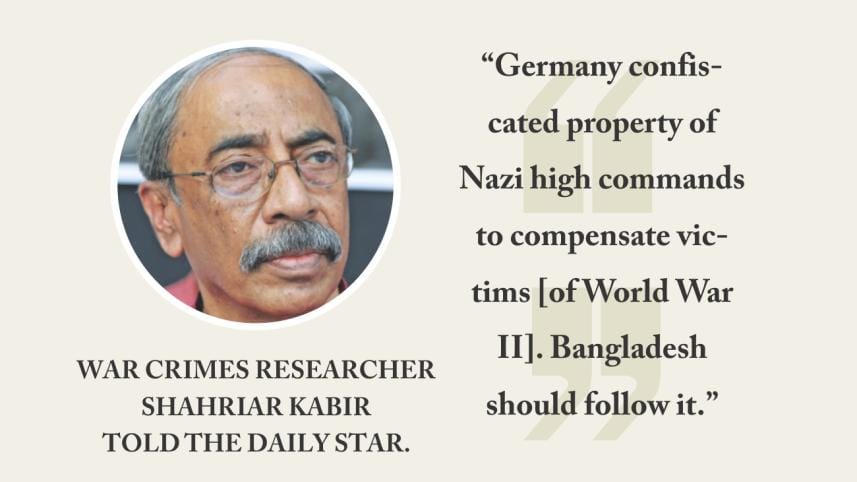Happy, yet not happy enough

Justice seekers were happy with the apex court yesterday upholding the death penalty handed down to war criminal Motiur Rahman Nizami but they would have been happier if it confiscated his wealth as well to compensate the victims.
Yesterday's verdict came at a time when the call is getting stronger for confiscation of all properties of convicted war criminals and the distribution of those among the families of freedom fighters and 1971 rape victims in hardship.
Ekatturer Ghatak Dalal Nirmul Committee, an organisation campaigning for the trial of war criminals for more than two decades, held a press conference on November 26, to press home this demand.
“After 1975, they [war criminals] had been given opportunities to live luxurious lives, amass wealth, and even become minister, whereas victims had been going through untold sufferings over the last 45 years. If the victims are compensated with the properties, confiscated from the war criminals, the trial would have been more fruitful,” said Shahriar Kabir, executive president of the committee.
Born in a run-of-the-mill family of Pabna, Nizami ascended to the top of Jamaat-e-Islami, a party which avowedly opposed Bangladesh's independence in 1971.
Nizami assisted war crimes convict Ghulam Azam, the then chief of Jamaat's East Pakistan wing, in forming the Shanti Committee, Razakar Bahini, Al-Badr, Al-Shams.
Up to September 1971, Nizami was the president of Jamaat's then student wing Islami Chhatra Sangha and the ex-officio chief of notorious killing squad Al-Badr.
After the war, he became active in politics again during Gen Ziaur Rahman's regime in 1979 and was the ameer of Jamaat's Dhaka city unit and member of its central executive committee from 1978 to 1982. Nizami was also assistant secretary general of Jamaat-e-Islami from 1983 to 1988 and became its secretary general in December 1988. He remained in the post until 2000.
After Ghulam Azam quit his party post in 2000, Nizami was elected the Jamaat ameer, a post he still holds.
Nizami was elected a member of parliament in 1991 and was the leader of Jamaat's parliamentary party from 1991 until December 28, 1994. After he was elected a member of parliament again in 2001, he became the agriculture minister (2001-2003) and the industries minister (2003-2006).
His accession to power and wealth even appalled the court.
The tribunal in its judgment termed it a slap in the face for the Liberation War, the martyrs, and the women who were violated and brutally murdered during the independence struggle.
“This shameful act [appointing Nizami as a minister] was disgraceful for the nation as a whole,” reads the judgment of the International Crimes Tribunal-1 delivered on October 29, 2014.
Shahriar Kabir said, “In many cases it is found that they killed only breadwinners of a family. For the last 45 years, members of those families had suffered financially. How these sufferings will be compensated?”
After the Liberation War, they amassed wealth. After 1975, they evicted family members of martyrs from their land, he said.
Germany confiscated the properties of Nazi high commands to compensate the victims of World War II. Bangladesh should follow it, Kabir said, adding that the government should revive the initiative of rehabilitating freedom fighters and victims of the Liberation War.
Johurul Haque, a witness in Nizami's case and the president of the advisory council of Santhia Muktijoddha Sangsad, said, “We're happy and hope he will soon be executed. But we request the government to confiscate the properties of all war criminals and use the money for the rehabilitation of the poor victims.”
Member of the advisory council of the Sangsad, Jamaluddin made the same appeal.
Talking to The Daily Star, war crimes trial prosecutor Tureen Afroz said reparation could be obtained from war criminals through a separate law or by bringing amendments to the International Crimes (Tribunals) Act, 1973.



 For all latest news, follow The Daily Star's Google News channel.
For all latest news, follow The Daily Star's Google News channel.
Comments